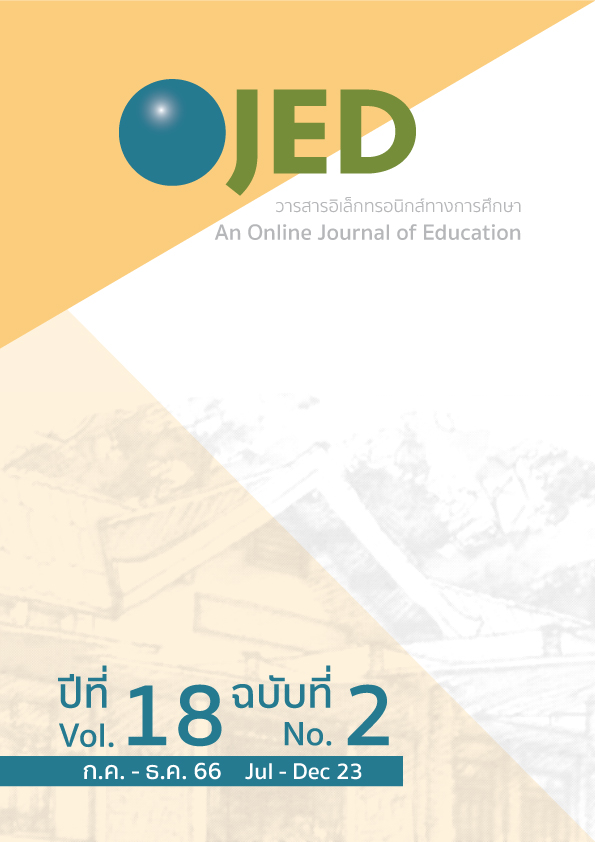Effects of Using an Instructional Process Based on the Transtheoretical Model on Adversity Quotient Ability Upper Secondary School Student
DOI:
https://doi.org/10.14456/ojed.2023.13Keywords:
adversity quotient ability, an instructional process based on the transtheoretical modelAbstract
The objectives of this research were to: 1) compare students’ ability to deal with adversity before and after using an instructional process based on the transtheoretical model, and 2) study students’ adversity ability to deal with adversity after using this transtheoretical model. The participants in this study consisted of 40 fourth year Matthayomsuksa students at an extra-large secondary school under the jurisdiction of the Secondary Education Service Area Office, Bangkok 1. The instruments used in this study included a test measuring students’ ability to overcome adversity, observation forms on students’ ability to overcome adversity, learning logs, and lesson plans using an instructional process based on the transtheoretical model. Data were analyzed using mean, standard deviation, t-test, repeated measure ANOVA, and content analysis. The findings showed that: 1) students had higher scores at overcoming adversity after being taught using the instructional process compared to before the teaching at the .05 level of significance, and 2) students’ ability to overcome adversity was improved, both holistically and when categorized by components, after using the instructional process based on the transtheoretical model.
References
กรมกิจการเด็กและเยาวชน กระทรวงการพัฒนาสังคมและความมั่นคงของมนุษย์. (2561). รายงานการพัฒนาเด็กและเยาวชน ประจำปี 2560. https://www.dcy.go.th.
ชนกนาฏ ยิ่งอุปการ และ จิตตินันท์ บุญสถิรกุล. (2560). ผลของกิจกรรมแนะแนวตามหลักอิทธิบาท 4 ต่อ
การเพิ่มความคิดเชิงบวกและความสามารถในการฟันฝ่าอุปสรรคของนักเรียนชั้นมัธยมศึกษาปีที่ 2
โรงเรียนจรัลพิชากร จังหวัดนครศรีธรรมราช. วารสารวิทยบริการ มหาวิทยาลัยสงขลานครินทร์,
(2), 76-85.
ณัฐสยานันท์ เวทำ และ ทักษ์ อุดมรัตน์. (2564). ศึกษาปัจจัยที่ส่งผลต่อความสามารถในการเผชิญปัญหาและ
ฟันฝ่าอุปสรรคของนักเรียนชั้นมัธยมศึกษาปีที่ 3 จังหวัดพิษณุโลก. วารสารบัณฑิตศึกษาปริทรรศน์
มหาวิทยาลัยมหาจุฬาลงกรณราชวิทยาลัยวิทยาเขตแพร่, 7(1), 231-245.
นพดล โชติกพานิชย์. (2549). การศึกษาและพัฒนาความสามารถในการเผชิญอุปสรรคด้านการเรียนของ
นักเรียนวัยรุ่น. [วิทยานิพนธ์ปริญญาโทที่ไม่ได้ตีพิมพ์] มหาวิทยาลัยศรีนครินทรวิโรฒ.
นารท ศรีละโพธิ์. (2554). การพัฒนารูปแบบการเรียนการสอนตามรูปแบบข้ามทฤษฎีเพื่อส่งเสริมความ
รับผิดชอบของนักศึกษาระดับปริญญาบัณฑิต. [วิทยานิพนธ์ปริญญาดุษฎีบัณฑิต,
จุฬาลงกรณ์มหาวิทยาลัย].
ปฐมาภรณ์ สานุกูล. (2557). แนวคิดการส่งเสริมความสามารถในการแก้ปัญหาคณิตศาสตร์กับความสามารถ
ในการเผชิญอุปสรรค. วารสารวิจัยและพัฒนาหลักสูตร, 4(1), 13-30.
พรทิพย์ อยู่ญาติมาก. (2558). ผลของโปรแกรมคอมพิวเตอร์ช่วยสอนที่ประยุกต์ใช้ทฤษฎีขั้นตอนการเปลี่ยนแปลงพฤติกรรมในการป้องกันพฤติกรรมเสี่ยงทางเพศของวัยรุ่นตอนต้น.
[วิทยานิพนธ์วิทยานิพนธ์ปริญญาโทที่ไม่ได้ตีพิมพ์] มหาวิทยาลัยมหิดล.
ภิญญาพัชญ์ ปลากัดทอง. (2551). การพัฒนารูปแบบการเรียนรู้เพื่อเสริมสร้างความสามารถในการเผชิญอุปสรรคของนักเรียนระดับช่วงชั้นที่ 2. [ปริญญานิพนธ์ปริญญาดุษฎีบัณฑิต, มหาวิทยาลัยศรีนครินทรวิโรฒ].
สำนักงานเลขาธิการสภาการศึกษา. (2552). การศึกษาองค์ความรู้เกี่ยวกับคุณลักษณะของคนไทยที่พึงประสงค์ : ความสามารถในการเผชิญและฟันฝ่าอุปสรรค. สำนักงานคณะกรรมการการศึกษาขั้นพื้นฐาน กระทรวงศึกษาธิการ.
สุชาดา เจริญไว. (2551). การศึกษาเปรียบเทียบความสามารถในการเผชิญและฟันฝ่าอุปสรรคของนักเรียนช่วงชั้นที่ 4 ที่มีระดับการรับรู้ความสามารถของตนเองทางการเรียนต่างกัน สังกัดเขตพื้นที่การศึกษาชัยภูมิ เขต 2. [วิทยานิพนธ์ปริญญาโทที่ไม่ได้ตีพิมพ์] มหาวิทยาลัยศรีนครินทรวิโรฒ.
ภาษาอังกฤษ
Han, H., Gabriel, K. P., & Kohl, H. W. (2015). Evaluations of Validity and Reliability of a
Transtheoretical Model for Sedentary Behavior among College Students. Am J Health Behav, 39(5), 601-609.
Keshmiri, F and et.al. (2017). Effectiveness of an interprofessional education model based on
the transtheoretical model of behaviour change to improve interprofessional collaboration. J Interprof Care, 31(3), 307-316.
Prochaska, J.O. (2006). Changing for Good Arevolutionary Six-stage Program for Overcoming
Bad Habits and Moving Your Life Positively Forward. Harper Collins Publishers.
Stoltz, P. G. (1997). Adversity Quotient: Turning Obstacles into Opportunities. John Wiley & Sons.
Stoltz, P. G. (2000). Adversity Quotient at work: Finding your hidden capacity for getting things done. Harper Collins Publishers.
hb.2012.06.007 Report20
Downloads
Published
How to Cite
Issue
Section
License
Copyright (c) 2023 An Online Journal of Education

This work is licensed under a Creative Commons Attribution-NonCommercial-NoDerivatives 4.0 International License.




